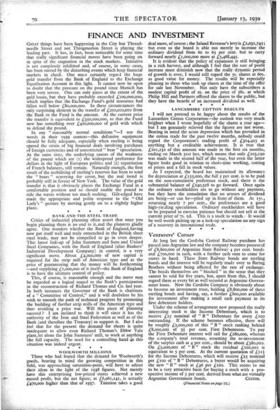BANK AND THE STEEL TRADE
Critics of industrial planning often assert that once you begin planning there is no end to it, and the planners gladly agree. One wonders whether the Bank of England, having now got itself well and truly entrenched in the British sheet steel trade, may not be compelled to go in even deeper. This latest link-up of John Summers and Sons and United Steel Companies, with the Bank of England (alias Bankers' Industrial Development Company) in control, is a very significant move. About £4,000,000 of new capital is required for the strip mill of American type and as the price of guaranteeing that the money will be forthcoming —and supplying L t,000,000 of it itself—the Bank of England is to have the ultimate control of policy.
This, if course, is reasonable enough and the move may be regarded as a logical sequel to the Bank's participation in the reconstruction of Richard Thomas and Co. last year. In both instances the Governor of the Bank is chairman of a " Committee of Control," and it will doubtless be his wish to smooth the path of technical progress by promoting the building of further strip mills of the American type and thus avoiding a price war. Will this piece of planning succeed ? I am inclined to think it will since it has the authority of the Iron and Steel Federation as well as of the Bank (and therefore the Treasury) to support it. But I also feel that for the present the demand for sheets is quite inadequate to allow even Richard Thomas's Ebbw Vale plant, let alone the John Summers' mill, to work at anything like full capacity. The need for a controlling hand n this situation was indeed urgent.






































 Previous page
Previous page